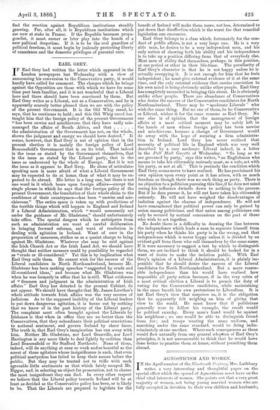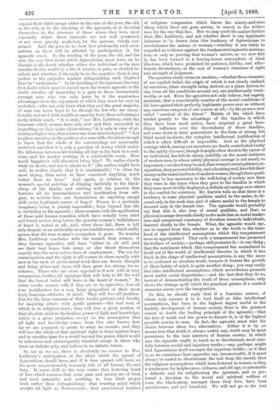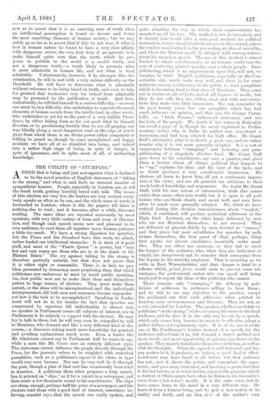AGNOSTICISM AND WOMEN.
I N the April number of the Nineteenth Century, Mrs. Latlibury
writes a very interesting and thoughtful paper on the special effect which the spread of Agnosticism must have on the chief vital interests of women. She points out that a very great majority of women, not being young married women who are fully occupied in devotion to their own children and husbands,
expend their chief energy either in the care of the poor, the old, or the sick, or in the teaching of the ignorant, or in devoting themselves to the interests of those whom they love, more especially where those interests are not well promoted, or are even grossly neglected, by the persons chiefly con- cerned. And she goes on to show how profoundly such occu- pations as these will be affected by participation in the agnostic creed. In the tending of the poor, the old, and the sick, the very first doubt which Agnosticism must force on its disciple is the doubt whether either the individual or the race benefits in this world by a life of misery, or pain, or clouded in- tellect, and whether, if the reply be in the negative, there is any justice in the prejudice against extinguishing such blighted lives by" euthanasia." In the teaching of the ignorant, the very first doubt which must be forced upon the honest agnostic is the doubt whether all knowledge is a gain to those innumerable average men who can only learn by it the numberless advantages from the enjoyment of which they must for ever be excluded,—who can only learn what they and the great majority of men can never hope to be, though the few who are excep- tionally endowed with wealth or capacity have these advantages easily within reach. "It is only," says Mrs. Lathbury, with the terseness which women have only now and then succeeded in engrafting on their acute observations, " it is only in view of at- taining a higher step, that a lower one is an unmixed good." "Let us place ourselves in the position of a man with education enough to know that the whole of his surroundings are necessarily wretched, and that it is only a question of money which makes the difference between his working all day on his back in a coal- mine, and his master working in a comfortable room. How much happiness will education bring him ? To realise clearly what we desire, and not to attain to it" [the author might have said, to realise clearly that it is unattainable] "is often far more trying, than never to have conceived anything much better than we have." And again, in relation to the woman's special privilege of clinging faithfully to the black- sheep of the family, and striving with the passion that borrows all its reasonableness and justification from reli- gion, to reclaim him, can Agnosticism do anything except chill every legitimate source of hope? Prayer to a probably imaginary being is plainly impossible ; hope beyond this life is forbidden to the agnostic ; there remains only the application of those mild human remedies, which have usually been tried and found useless long before the genuine woman's faithfulness of heart is tested at all; and, when these fail, there is left only despair, or an artificially-acquired indifference, which really means that the true woman's occupation is gone. No wonder Mrs. Lathbury concludes with the remark that women, if they become agnostics, will have "either to sit still and see their best hopes fade away, or else throw themselves eagerly into the more active lines of employment. The cry for emancipation, and the right of all women to share equally with men in the rush of professional work that can drown thought and bring riches and fame, will then grow too strong for re- sistance. Those who are most opposed to it now will, in very compassion, further all openings that will help to fill the void that the loss of belief will leave in the heart of women." In other words, women will, if they are to be agnostics, lose all true justification for a very large proportion of their most truly feminine attitudes of mind. They will lose all justifica- tion for the large measure of their tender patience and faculty for inspiring others with gentle patience—the real root of which is in religious trust; they will lose a great portion of that absolute faith in the healing power of light and knowledge, which is a gross prejudice, except on the assumption that all light and knowledge comes from One who knows how far we are prepared to profit by what he reveaLs ; and they will lose the whole of that spiritual right to hope against hope, and to sacrifice time for a world beyond the grave, which would be ridiculous and extravagantly wasteful except in those who trust an infinite pity, and believe in an infinite future.
So far as we see, there is absolutely no answer to Mrs. Lathbury's anticipation of the effect which the spread of Agnosticism should have, and if it does spread, will have, on the more unquestionably womanly side of all human life and duty. It must chill to the very centre that fostering heart of love which assumes that even pain and misery are of God, and need sympathy and soothing to bear their proper fruit rather than extinguishing; that trusting mind which accepts all light as Heaven-sent ; that paradoxical instinct of religious compassion which leaves the ninety-and-nine sheep which have not gone astray, to search in the wilder- ness for the one that has. But we may push the matter further than Mrs. Lathbury, and ask whether there is any legitimate inference to be drawn from this tendency of Agnosticism to revolutionise the nature of woman,—whether it can fairly be regarded as evidence against the fundamental agnostic assump- tion, or only as proving that woman's nature, as we now find it, has been formed in a forcing-house atmosphere of ideal illusions, which have promoted its patience, fidelity, and affec- tionate devotedness, at the cost of women's clearness of sight and strength of judgment.
The question really turns on another,—whether those elements of our explicit belief, the origin of which is not clearly realised by ourselves, (their strength being derived, as a plant derives its sap, from all the conditions around us), are intellectually trust- worthy or not. Even the agnostics not only believe, but eagerly maintain, that a considerable number of the moral conditions of life have gained their perfectly legitimate power over us without any conscious conquest of our reason at all,—by the process now called "survival of the fittest." Habits of life which have tended greatly to the advantage of the families in which they have been most active, have acquired a great here- ditary influence over the descendants of those families, and come down to later generations in the form of strong but blind moral instincts, the complete intellectual justification of which is often difficult or impossible. Just as the physical courage which, among our ancestors, no doubt contributed vastly to the safety of a race, though it might often shorten the career of an individual, has left its stamp indelibly on the moral instincts of modern men, to whose safety physical courage is not nearly so important,—so also it may be said, that women's sweet patience, re- signation, deep personal fidelity, and educating zeal, have left their stamp on the moral instincts of modern women, though these quali- ties may be less necessary to the well-being of society now than they were in the times when they gave to the families in which they were most vividly displayed, a definite advantage over others in the conflict for existence. Mr. Darwin tells us that there is a tendency in some physical qualities useful to the males, to de- scend only in the male line, and of others useful to the female to descend only in the female line. The agnostic would probably say that this is also true of moral qualities, and that, as physical courage descends chiefly in the male line, so moral tender- ness and exceptional constancy of devotion towards individuals, descend chiefly in the female. What, the agnostic would say, can be argued from this, whether as to the truth or the false- hood of the intellectual assumptions which this temperament loves to appropriate? That such a temperament has promoted the welfare of society,—perhaps still promotes it,—is one thing ; that the nutriment which this tomperament has assimilated to itself out of the world of intellectual theories in which it has lived, in the shape of intellectual assumptions, is any the more to be reckoned as absolute truth, because it fosters the growth of these habits of mind, is quite another thing ; you may easily find false intellectual assumptions, which nevertheless promote most useful social dispositions ;—and the fact that they do so, instead of demonstrating the truth of those assumptions, only shows the strange spell which the practical genius of a marked character exerts over the imagination.
To this, we should reply that if a feminine nature, of whose very essence it is to feed itself on false intellectual assumptions, has been in the highest degree useful to the healthy development of human society, there is the greatest reason to doubt the leading principle of the agnostic,—that the love of truth and the power to discern it, is of the highest possible service to man. In fact, the agnostic must take his choice between these two alternatives. Either it is by no means true that truth is always useful, nay, truth may be most pernicious to the best interests of human society, in which case the agnostic ought to teach us to discriminate most care- fully between useful and injurious truths,—nay, perhaps, might find Agnosticism itself amongst the injurious truths ; or if that is, as we sometimes hear agnostics say, inconceivable, if it must always be useful to discriminate the real from the unreal, then the religious assumptions which have fostered in women so deep a tenderness for helplessness, sickness, and old age, so admirable a didactic zeal for enlightening the ignorant, and so pro- found a devotion to the moral and spiritual welfare of even the black-sheep amongst those they love, have been mischievous, and not beneficial. We will not go so far just now as to assert that it is an unerring note of truth when an intellectual assumption is found to favour and foster the most ennobling elements of human society ; but we may safely go so far as to assert that if this be not true, if what is best in human nature be found to have a very close affinity with dangerous errors, the very first duty of an agnostic is to make himself quite sure that the truth which he pro- poses to publish to the world is a useful truth, and not a dangerous truth,—a truth likely to promote what is most admirable in human life, and not what is least admirable. Unfortunately, however, if he attempts this dis- crimination, he will be met with a very serious difficulty on the threshold. He will have to determine what is admirable without reference to its being based on truth, and even to take for granted that tendencies very far indeed from admirable may be promoted by the publication of truth. And here, undoubtedly, he will find himself in a serious difficulty,—as every one must be in a difficulty who undertakes to separate the moral elements of human society from the intellectual, in other words, who undertakes to act for us the part of a very fallible Provi- dence, by either hiding from us for our good what he himself discerns, or by proclaiming frankly that we are all groping our way blindly along a most dangerous road on the edge of preci- pices from which there is no divine power either competent or willing to guard us, though by some unexplained and happy accident we have all of us stumbled into being, and indeed into a rather high stage of being, in spite of danger, in spite of ignorance, and in spite, most of all, of misleading knowledge.




































 Previous page
Previous page